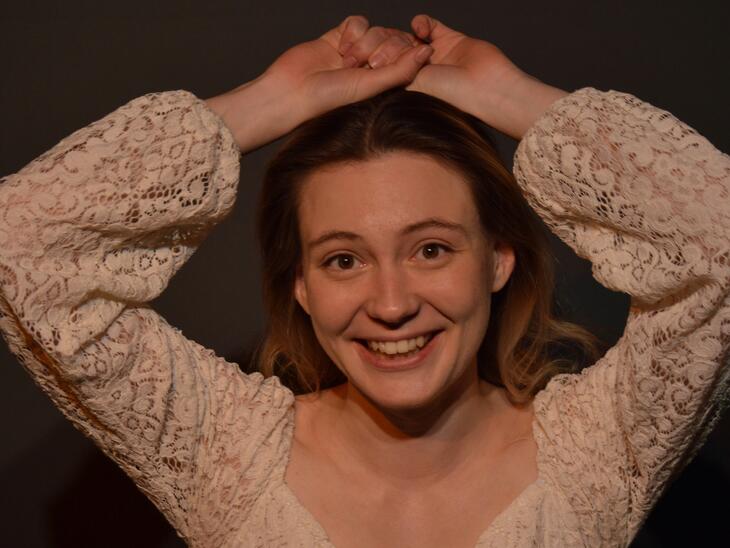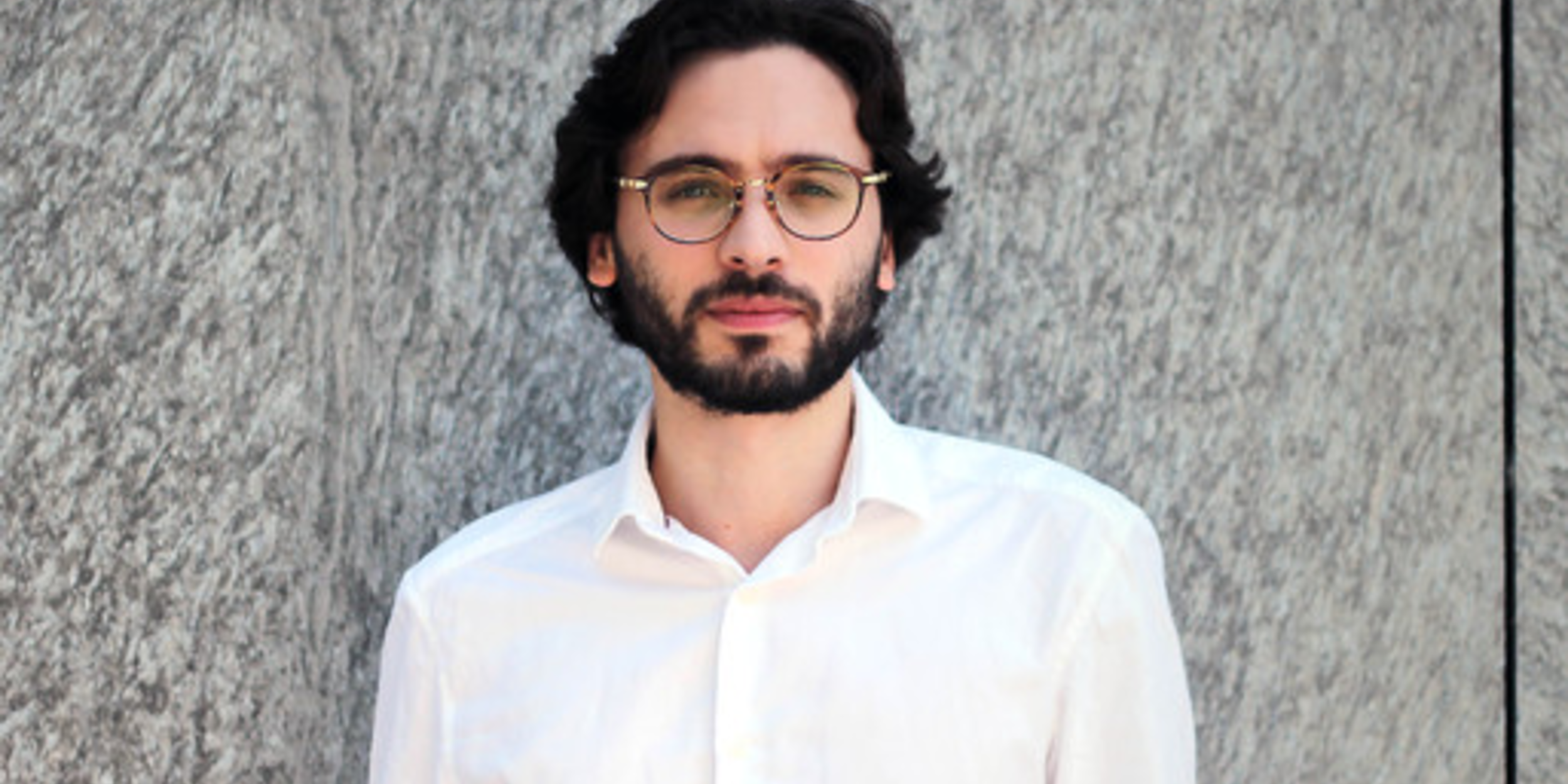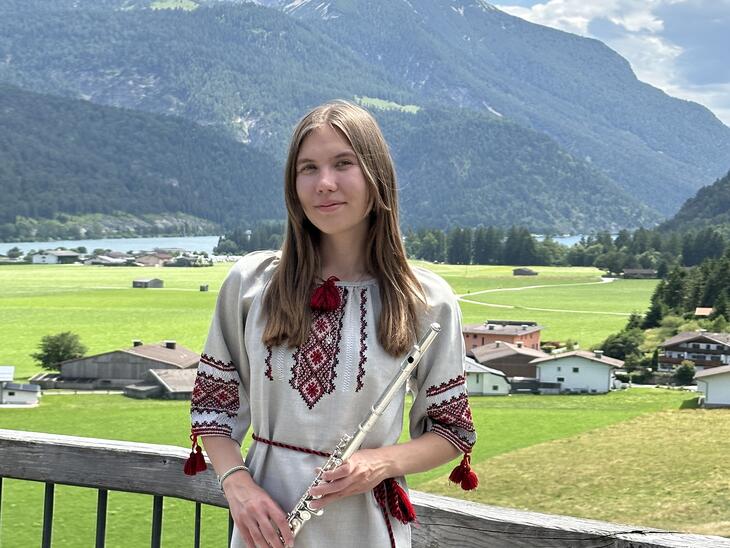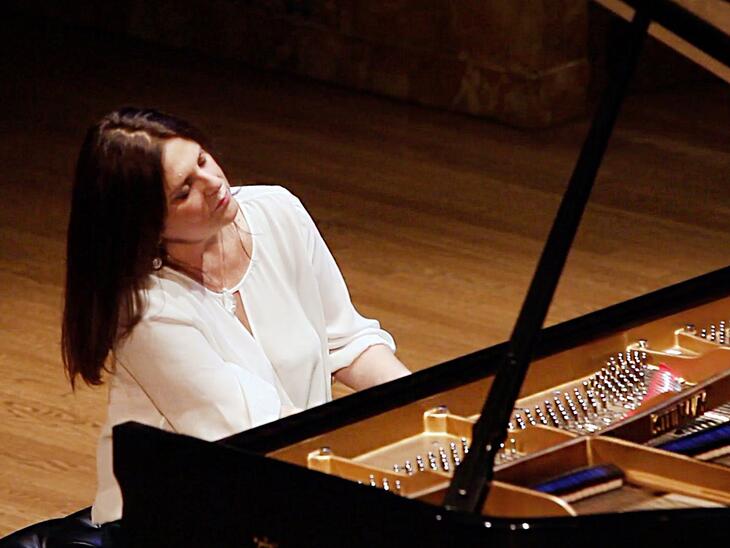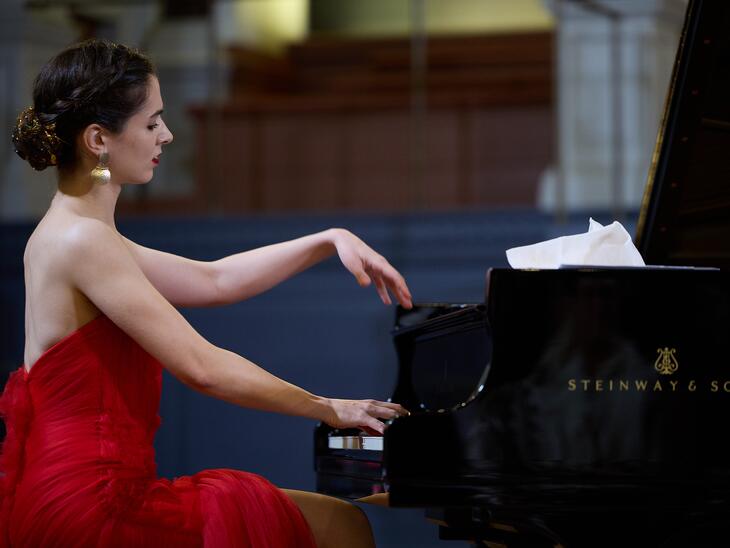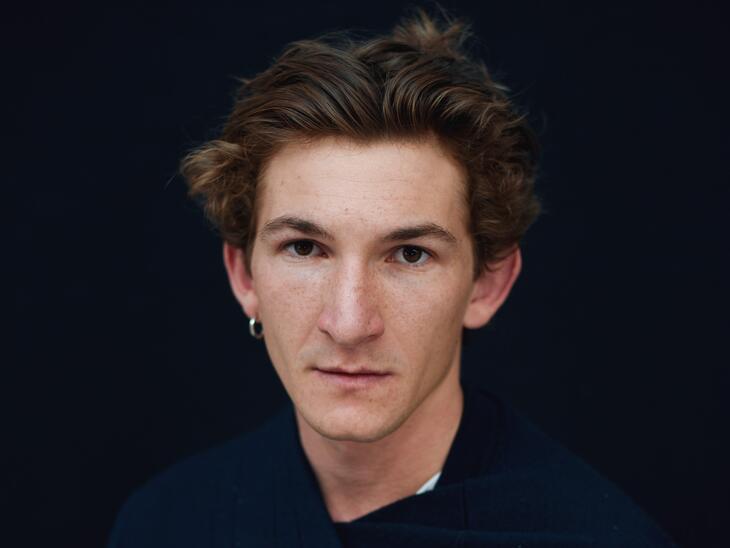He has received numerous composition prizes and scholarships, including the impuls Composition Prize Graz, a scholarship from the Academy of Arts Berlin, a scholarship from the International Ensemble Modern Academy, his works are performed internationally by renowned performers such as Klangforum Wien and Ensemble intercontemporain, and his publications have appeared in Wolke Verlag, Rombach Verlag and Musik & Ästhetik, among others. He has given numerous lectures on his music in Germany, Austria, Switzerland, Sweden, the United Kingdom, and the United States, and has given composition master classes in Madrid, Detmold, Singapore, and Udine. Since 2019, his works have been published by Edition Gravis. In October 2021, he followed the appointment to the professorship of composition and music theory at the Gustav Mahler Private University in Klagenfurt.
One of your works was selected this year for the MATA Festival in New York. A festival for new music that has been described as the "most exciting showcase for outstanding young composers from around the world." What does it mean for a composer to participate?
The MATA festival is very well known in the U.S. and has a very good reputation in the international composition scene. It's not a prize in the strict sense. It was a call for scores. Every year over 1000 composers* submit their works, and a small selection of about 10 works make it to the festival. It's almost like a lottery (laughs). But of course I am happy about it and many people come to hear the works. I wrote the selected work, Auslöschung II, based on Thomas Bernhard's novel of the same name, for ten vocalists, and it premiered at the Kulturpalast in Dresden in 2019. A performance at the MATA Festival allows for very great attention.
What role do prizes and scholarships play in the career of a composer today?
A very big one. There are calls for scores, prizes, scholarships, residencies, and all these opportunities give composers* the chance to present themselves and their works. If we didn't have this opportunity for presentation, we would develop much more slowly in our work. The rehearsal work is a very crucial part of this. You learn an incredible amount. After my studies at the Mozarteum, I was very lucky to receive a scholarship from the International Ensemble Modern Academy in Frankfurt. I was allowed to work with the IEMA ensemble and the Ensemble Modern on a daily basis for a year. In the process, I learned a lot about rehearsal psychology and how to handle instruments. But also how to effectively lead a rehearsal. The direct practical experience to this extent is luxurious; you don't have that in the normal everyday life of a composer. There were two commissions, one for chamber instrumentation and one for large ensemble. One of my pieces was Tawāf for amplified grand piano, large ensemble, and electronics. The usual number of rehearsals of three was insufficient. I wanted 12 rehearsals; finally seven was enough. The number of rehearsals usually cannot be negotiated. It was indeed a luxury and I was able to take a lot from that time.
Residency grants are also a very important thing because you see a lot. Travel is fundamentally important for the inspirations, the impressions, for things that you may not process directly but realize the significance of individual moments and acquaintances three four years later.
Then there's the larger prize money, which broadens the scope. That allows the focus to be completely on composing. The smaller opportunities like Call for Scores, are equally important because one leads to the other and every performance is important. Therefore, every minute of rehearsal should also be used as effectively as possible so that the performance becomes exactly as it is envisioned.
How can we imagine your work as a composer? What is your approach? How does a compositional process work? What role do harmony and rhythm play, how do you find the right chords?
That's a great question (laughs). In May, I will give my inaugural lecture entitled Composing and Exploring at Gustav Mahler Private University, and it will be about exactly that. The composition process can't be generalized; of course, I can only speak for myself. First of all, it is very important that I have a certain regularity in composing. Relying only on inspiration is risky, because it can happen that you get lucky and a thought comes at the right time, but you can also get out of the process and then it's all the more difficult to get back in. My first professor at the Mozarteum, Adriana Hölszky, had always said: "Composing is like being on the open sea with a ship. When the wind is good, you have to set the sails." That means taking advantage of favorable situations artistically. Even if that means working through the night. For example, I often can no longer define or describe the actual moment of creation. I am then in a different state of consciousness. In art, one creates a second reality - as Adorno put it so beautifully.
An artist lives in this other reality. Ingeborg Bachmann, for example, said that she only lived when she wrote. I maintain that this is true for all true artists. The concrete process has a lot to do with being alone, but you still need the feedback and collaboration with the musicians. New directions need to be tried out. For example, I call musicians I know and ask them to play something, to try something. Of course, you have to call the right people, because new things can often be difficult at first. It was important to me from the beginning to go outside and I would recommend it to everyone. That was one of the first things I learned from Adriana Hölszky. She said my work was quite great, but it was more important to go outside with the works so that they would be performed by professional ensembles. It's not enough to perform the works at the university with fellow students for a few years. But this is true for all subjects. This step automatically brings about a change in compositional thinking. Suddenly the boundaries of what is possible shift and at some point it is realized that there are hardly any limits. Composing is thinking without limits, dreaming. At some point, however, one is confronted with reality.
Would you describe composing more as a craft or as a reflection of certain events, experiences, literary subjects or time periods/epochs?
Reflection is a crucial aspect, also the reaction to certain experiences has meaning. Maybe not necessarily consciously, however one certainly reacts in the unconscious to things that have been experienced. A social responsibility also plays a role, as social events are reflected through art and bring new insights. Craft is certainly important for professional work. You have to know how to implement things. Whereas I think that a piece that is based on a good idea but the craft is not perfect is better than a piece with a bad idea and the best craft. Craft can always be learned - it is a means to an end. Creativity may be stimulated, but ultimately you either have it or you don't. Execution needs craft, which of course is reflected in composition lessons. However, at a certain point, a professional level, craft becomes less important: it is then taken for granted. Critical self-reflection, discussions about aesthetics, other arts, about events and so on follow.
How do you manage to leave the familiar tones of renowned composers of past eras and create something completely new?
There is no such thing as something completely new. Everything is evolution, all people have a tradition and socialization. Of course, attempts can be made to create breaks, but the unconscious remains. Even such great personalities as Stockhausen, who were certainly criticized, said that they did not break, but rather added. Schoenberg was not the great revolutionary either; he referred to Brahms again and again. But it can be tried to take other perspectives and thus to develop something new. The new is often not visible at first sight. Sometimes the composition process surprises you. The work must be extremely flexible in the process. Directions change and 12 minutes suddenly become 25 minutes, which the work requires. What has to emerge emerges. Regardless of whether it is performed once, ten times, or a hundred times. One good performance is more valuable than ten bad ones. Art is also allowed to fail in the process and result. That is quite essential. True to Samuel Beckett's motto "ever tried, ever failed, no matter, try again, fail again, fail better."
Are there any particular sources of inspiration for you? Was it always clear to you that you wanted to compose?
Yes, composing was my goal very early on. I started with piano, but composing was in the foreground early on. I have always been interested in creative work, and so I consistently followed this path. In the city where I grew up, there was and still is the Ensemblia Festival for New Music. In the more than 30 years of the festival, all the big names were represented there: Lachenmann, Hölszky, Spahlinger and many others. And so I was lucky enough to come into contact with New Music at a very early age. For me, there was no break between composers of the past centuries and composers of new music. That developed quite naturally for me. There are many sources of inspiration. Among other things, music from other parts of the world. I find music that works very strongly with ornaments exciting. From Arabic music we know that the musical, melodic line and not the harmony is in the foreground. This allows for a completely different richness in terms of connecting tones - with glissando and vibrato. Literature also plays a decisive role for me: in recent years, especially Thomas Bernhard. So I composed a large 45-minute Thomas Bernhard cycle. In addition, coffee houses play an important role as a source of inspiration (laughs). When I came to Austria in 2010, I immediately fell in love with Café Bazar. The inspirations are, of course, very work-specific. The important thing is to stay curious, to go through the world with open ears and eyes. That's why traveling is also very important. Although I've never been to Japan, I'm interested in the Karōshi phenomenon, for example. It refers to the culturally induced overworking that leads to death. My piece Karōshi for soprano with sound objects is part of the Bernhard cycle. With Bernhard, we know that the protagonists are always in an extreme state of inner and outer tension, due to certain events, depressive moods, etc. I also like to observe rituals from different cultural contexts and compose rituals from them in turn.
You have already said a lot about your works, but is there anything else that you would like to particularly emphasize or convey with your compositions?
It is very often about fragile states, about friction, it is about being tense. The stage presence must be extreme in my works. The way I interpret my music is very important. I emphasize this again and again in communication with the musicians. The musicians are extremely challenged in my works. This is an existential experience that has great significance for me. Both in the composition process itself and in the performance of the works. When my studies were finished, I lived freelance for several years, with many residency grants. I had no scheduling obligations and was completely free. In this situation, I tried different schedules for composing. Sometimes I composed at night, then started in the late afternoon, or in the evening - quite different. This was also an existential experience and sometimes exhausting for the body. The interesting thing I took away from this is that each work has its own schedule. Each work challenges me in a different way and I have to adapt to it.
What role do publishers play in the careers of composers? How do you get a publisher?
I was approached by Edition Gravis some time ago. It's a small publishing house in Berlin that is very committed to young artists. For me, this publishing house is a stroke of luck, because it prints my handwritten manuscripts. That is no longer a matter of course. At the Ricordi publishing house, for example, there is a competition in which only computer-written scores can be submitted. The winner then receives a publishing contract for several years. If a composer writes by hand, he/she is already excluded. I make few compromises when it comes to art. For me, the process of writing on paper is part of the work. The haptic experience is very important and personal. I also get this feedback from the musicians, who can interpret my scores better that way.
Why are there far fewer female composers than male composers in the public perception?
Fortunately, this is something that is changing. In my role as professor of composition at the Gustav Mahler Private University of Music, I actively campaigned for structural changes to take place. The background is explained by the history of music. It was simply not allowed for women to compose. We know the letters from Robert to Clara Schumann from which it is clear that Robert prevented Clara from composing; likewise the story of Alma and Gustav Mahler. Even if women composed, the works were not included in the canon. Music history is, after all, always music historiography of individuals or a group of individuals. But that is changing more and more. There are now also international prizes aimed exclusively at women composers. Ideally, we will overcome all of this at some point, and it will then only be about the quality of the works and no longer about who or which gender is behind the composing person. Because what matters is that music is full of quality and content, which gender, which skin color, which denomination a person has is completely irrelevant! You now pass on your knowledge and experience as a professor to young up-and-coming artists.
What is the beauty of this work and what do you want to convey?
From my point of view, it is very important to put yourself into the personality of the other person, which also comes up against natural limits. It's always about encouraging students so that their creativity reaches the highest level. You can tell very quickly if someone has talent. Talent is the most valuable gift to be nurtured. I also see myself as a companion to young composers who are searching for their own voice. Composing is always searching, no matter how old you are. You have to try to understand what is important for a young person at a particular moment. It can be very concrete things, something crafty or motivating. It can also be how to deal with rejections. It's important not to let yourself get sidetracked and to always keep going. That's what I want to convey, and I want to do it at eye level. Perhaps the term "composition students" is not ideal either; it would be better to simply call them young composers. Appreciation of the work and efforts of young composers is very important. Furthermore, the psychological aspect is also important. With the wrong choice of words, a lot can be destroyed in composition lessons. Artists are mostly very sensitive and delicate people. The sensitivity of language is therefore essential. Teaching is very enriching for me on several levels. Dealing with people of different ages shows, among other things, how different perspectives can be. When I teach, I reflect on my own perceptions and remember my own learning processes. It simply makes me very happy when I see that things I try to teach lead to success. However, I cannot show the young composers their way, they have to find it themselves. I can only give impulses, try to uncover hidden potential, help the young composers to uncover the way into their inner being. Because: If someone has something to say, he will also find the way and the means to say it.
What skills do you think a good composer must have?
To look for opportunities and to actively perceive them, to always keep going and not let oneself be sidetracked, to gain practical experience. There are many books about instruments, but when writing for clarinet, it's best to sit down with a clarinetist and rehearse, have things explained to you, try things out. Rehearsal experience is very important and can only be taught to a limited extent at university. Self-confidence must be built up and doubts reflected upon. Knowing about current developments in the scene is important in order to be able to contextualize one's own composing in society. It is a matter of keeping up to date. Festival visits and concerts are essential, or at least catching up on the internet if you can't go. It's important to know what pieces have just premiered to be as close to the practice as possible.
What are you particularly looking forward to at the Gustav Mahler Private University in Klagenfurt?
Because of the still-young accreditation of the Gustav Mahler Private University of Music, I am in the unique situation of building up the composition department from scratch, especially with my colleague Jakob Gruchmann. There are no entrenched structures like at many other universities. This is a very valuable task with a lot of responsibility. We are analyzing important aspects of composition studies, checking which subjects are needed and how the emphasis should be placed. We will certainly hear a lot about this program. We are also building a doctoral program in composition, which is scheduled to begin in two to three years. That is, of course, a very nice task!
What working conditions would you like to see for composers*? What should change?
There are many things! Basically, music, including contemporary art music, should be much more prominent in school education. The feeling and sensitivity for music must be developed. Unfortunately, many composers still work under precarious conditions. There are guidelines for composition fees, which are unfortunately hardly ever adhered to. Of course, there is the Composers' Association and the AKM, which represent these interests. On the other hand, it must be said that there has never been social justice in the arts. We still have to fight for our place in society and argue why our work is valuable. This is likely to continue for some time. Therefore, it is desirable that more commissions be awarded, many more concerts be held, better rehearsal conditions be created, and several performances be organized in different cities in addition to a premiere. If funds could be reallocated, I would say: Please put everything into art!
